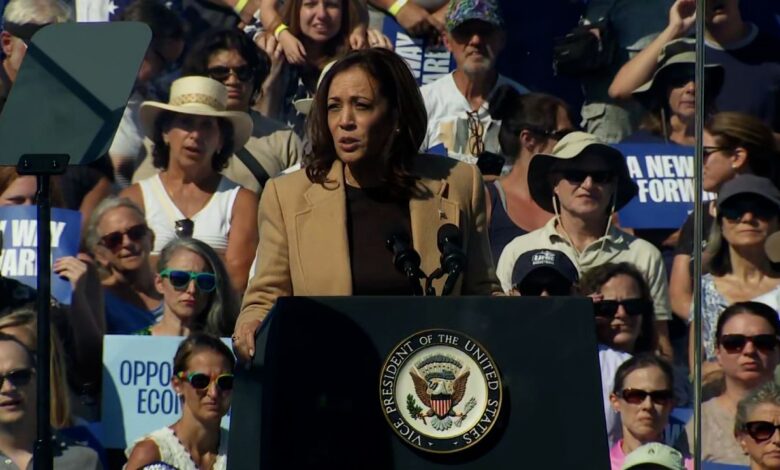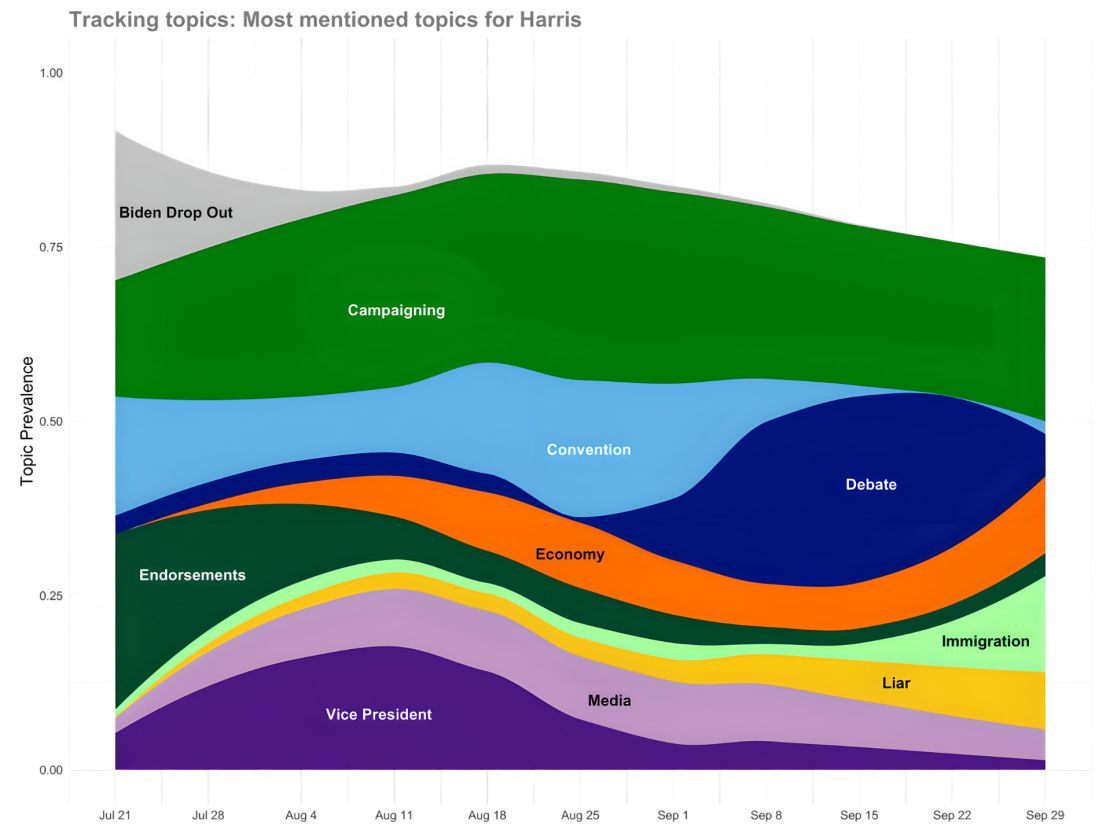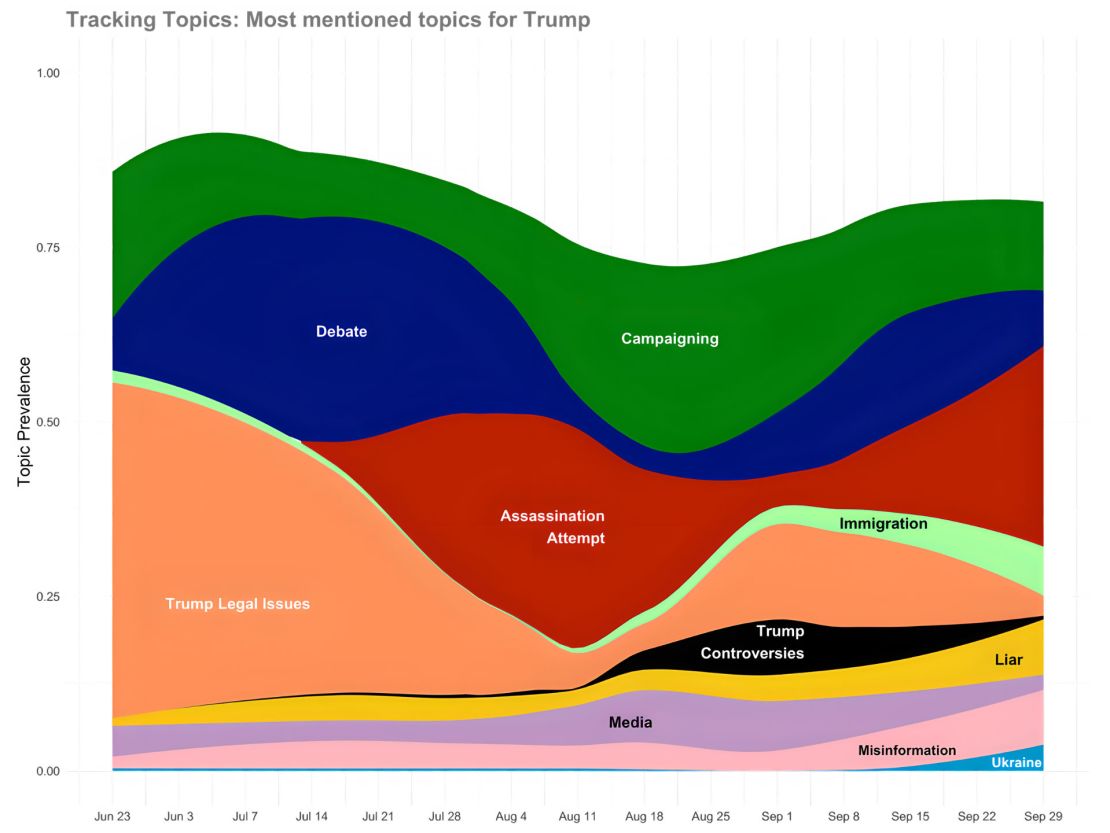
Kamala Harris’ visit to the border and speech outlining her economic vision captured the attention of a sizable share of Americans as September came to a close, according to new findings from The Breakthrough, a polling project that tracks how the public is following election news. But some emerging trends in the data hint at warning signs for the vice president’s campaign.
The share of Americans hearing anything at all about Harris has dropped each week since her presidential debate with former President Donald Trump in early September, and during that same time, the tone Americans use in describing what they’ve heard about her has grown more negative, reaching the lowest point of her campaign in the latest results.
Looking at what people say they have heard, read or seen about Harris, “lie” has emerged as a persistent top word that some Americans associate with her. In the latest data, it was the fourth-most mentioned word after “border,” “polls” and “campaign.” It ranked sixth in the previous week’s data and second the week of the ABC News presidential debate, after ranking no higher than 12th in earlier rounds of the survey and no higher than 20th prior to the Democratic convention in August.

The survey, conducted September 27-30 by SSRS and Verasight for research teams from CNN, Georgetown University and the University of Michigan, measures what Americans say they have recently heard, read or seen about Harris and Trump.
The share of Americans mentioning words such as “lie” or “liar” when asked what they’ve heard about Harris remains quite small — just 6 percent in the latest data, compared with 15 percent who mentioned something related to immigration, for example — but it has grown over time, rising from three percent or less prior to the Democratic convention to peak at 9 percent shortly after the debate.
“Kamala says nothing,” wrote one respondent included in the latest survey. “She uses a bunch of words that make no sense. She says she will close the border, but that is a lie to get elected. Everything she promises are lies.”
The broader focus on immigration (mentioned by 15 percent in relation to Harris) and the economy (mentioned by 13 percent) in the latest data marks a notable shift in responses about Harris, following her campaign’s efforts to focus attention on the two topics with a visit to the southern border in Arizona and an economic policy speech in Pittsburgh. It marks the first time in the survey that multiple policy-related topics have landed in the top five for Harris, and the most recent data saw by far the most mentions for immigration-related words in relation to her campaign since she entered the race in late July.
“I have watched her speeches and appreciated her articulate explanation of her policies and positions on various things,” another respondent wrote. “Her concern for all and ability to concretely point to solutions to problems is a sharp contrast to Donald Trump.”
On Trump’s side, the assassination attempts against him remain prominent in the public’s attention, while immigration has faded a bit and his meeting last month with Ukrainian President Volodymyr Zelensky garnered attention.
“He met with Zelensky and was not very enthusiastic about helping Ukraine,” one respondent wrote.
Responses calling the former president a liar are also persistently near the top of his list. About 8 percent in the latest data use the word “lie” or “liar” in relation to Trump. That figure has frequently been in the high single digits as a share of topics about Trump since the start of the survey in June, dipping below that at times, including around the first assassination attempt against the former president and the Republican National Convention.

Although responses about Harris are generally still less negative in tone than those about Trump, there has been a notable decline in overall sentiment in the Harris responses, while Trump’s numbers have rebounded slightly following a post-debate drop. For Harris, the negative shift is apparent across parties, with sentiments expressed by Democrats, Republicans and independents all tilting slightly more negative in the new data than in the week prior. For Trump, though, sentiment has held steady among Republicans, while shifting slightly less negative than the previous survey among independents and Democrats.
The latest poll found that just under two-thirds of Americans (64 percent) reported seeing, reading or hearing something about Harris, compared with 68 percent who said the same about Trump. It marks the fourth straight week in which more people reported hearing about Trump than they did about Harris, and it’s a notable drop from the previous week in the shares saying they’d heard about each candidate (Trump down 7 points, Harris down 5).
The overall level of attention to the presidential candidates now is lower than it was at this point in previous cycles, though that may be a side effect of debate timing. In 2020, for example, more than 8 in 10 Americans reported having heard news about Trump and Joe Biden in the same week of that campaign, but there was a presidential debate held on September 29. In 2016, there was a mid-September dip in attention ahead of that year’s first debate between Trump and Hillary Clinton, held on September 26.
“It has been relatively quiet this week,” one respondent to the latest survey wrote when asked about Trump. “I haven’t heard of anything.”
CNN’s Ariel Edwards-Levy contributed to this report.




